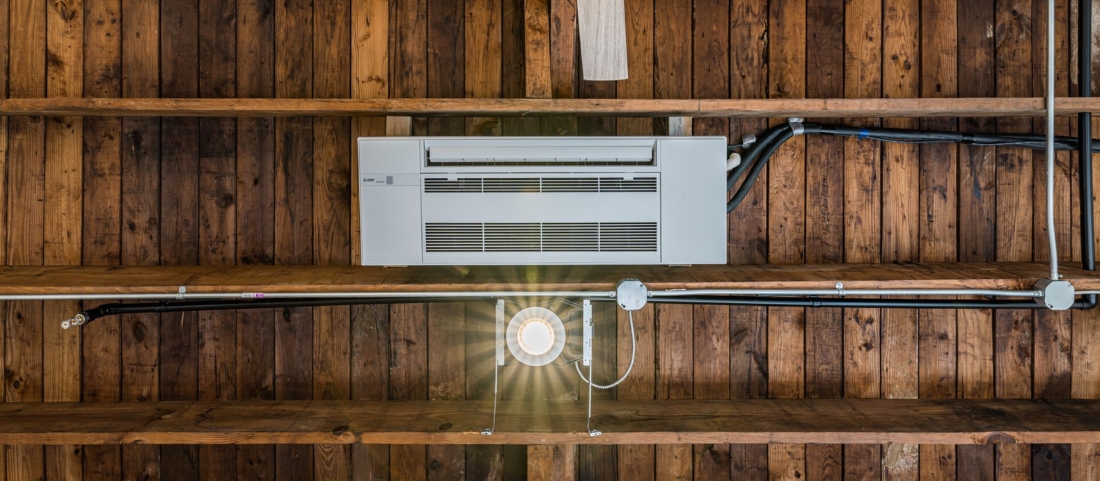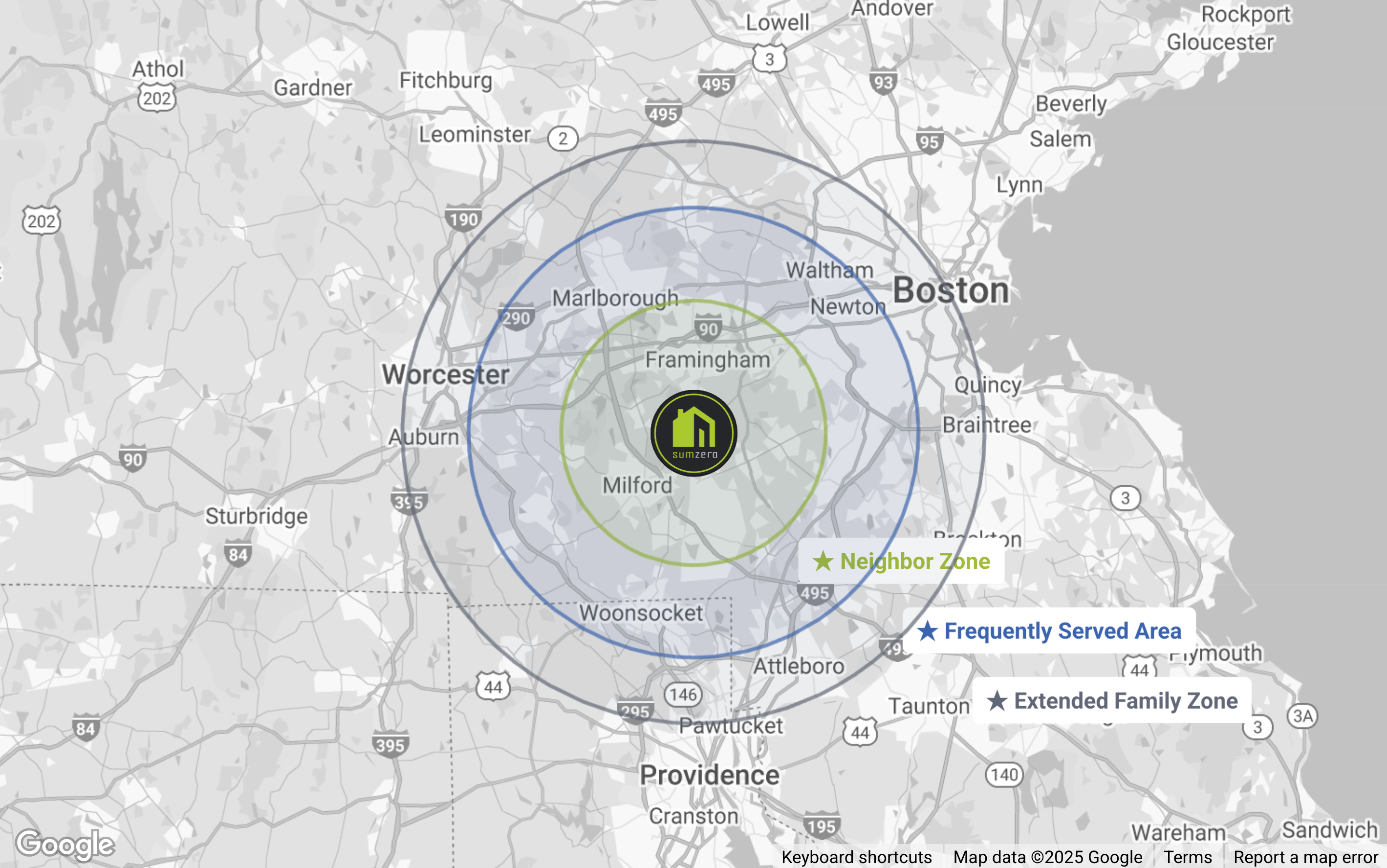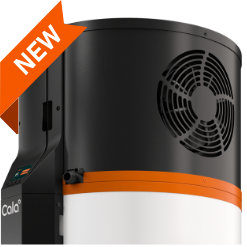Existing Home Heat Pump Retrofit | Harvard, MA
A heat pump retrofit is the process of upgrading an existing home’s heating and cooling system with a high-efficiency air source heat pump to reduce energy bills and improve year-round comfort. If you're in Harvard, MA and considering retrofitting heat pumps, our professional ducted heat pump retrofit services deliver a seamless, energy-efficient solution tailored for older homes.

What Makes Heat Pump Retrofits Ideal for Harvard, MA Homes?
In Harvard, MA, where winters are long and crisp and summers can reach uncomfortably humid peaks, the need for adaptable, energy-efficient home comfort systems is essential. Many homes in the area—especially those built before the 1990s—were not designed with modern HVAC systems in mind. This makes heat pump retrofits one of the most effective solutions for ensuring year-round efficient heating and cooling.
Massachusetts is also one of the leading states in renewable energy incentives. Through programs like the Mass Save® rebates and federal tax credits, Harvard residents stand to save significantly when upgrading to more efficient systems. Choosing a retrofit heat pump not only brings long-term utility bill reductions but also enhances indoor comfort and air quality—a solution designed for New England’s unique climate challenges.
“In Harvard’s older colonial and cape-style homes, replacing outdated systems with modern heat pump retrofits has proven to be one of the most impactful upgrades for both comfort and long-term energy savings.” — Local HVAC Energy Consultant, Central Massachusetts
Benefits of a Heat Pump Retrofit for Harvard MA Homeowners
Lower Energy Bills with Year-Round Efficiency
One of the leading reasons homeowners choose a heat pump retrofit is the drastic reduction in energy use. Traditional fossil-fuel systems run at consistent high outputs regardless of demand, while modern inverter heat pump technology modulates energy use based on temperature needs. This means:
- Lower electricity consumption in winter and summer
- Improved performance over single-speed systems
- Reduction of carbon footprint, aligning with Harvard’s clean energy goals
The combination of these factors produces substantial energy savings, especially in Harvard's four-season climate.
Seamless Integration with Existing Heating Systems
Most houses in Harvard use oil, propane, or older electric baseboard heat. A major benefit of a heat pump retrofit is that it can work in tandem with your current setup. Whether you're upgrading from baseboard heating or an outdated furnace, a ductless retrofit or ducted retrofit can often use existing infrastructure with some modifications.
Homeowners have the flexibility of supplementing existing systems or fully replacing them, depending on budget and comfort preferences.
Boosted Home Comfort and Air Quality
Modern heat pump systems are not just about energy savings—they significantly improve everyday comfort. With features like variable-speed fans and air filtration, a home comfort improvement is immediate. Residents experience:
- More consistent temperatures across multistory homes
- Reduction of hot and cold spots
- Cleaner indoor air from advanced filtration systems
These enhancements are especially beneficial in older Harvard homes that may struggle with uneven heating or poor insulation.
“Thanks to our retrofitted heat pump, our 1930s home is finally warm in January without turning to space heaters—and we’re paying half of what we used to.” – Local Homeowner in Harvard’s Still River neighborhood
How a Retrofit Heat Pump Works with Your Existing System
Understanding the Retrofit Process
The first step in a retrofit heat pump installation is evaluating your home’s existing system. Our HVAC professionals assess insulation, square footage, and ventilation to determine compatibility and system sizing. In many cases:
- We can connect the new heat pump to your existing air ducts
- Or opt for a ductless retrofit for room-by-room solutions
- Wall-mounted or ceiling-mounted indoor units often work best for older homes with minimal ductwork
This flexibility is key in Harvard, where homes often vary widely in layout and age.
Hybrid Systems: The Best of Both Worlds
Sometimes, replacing your entire heating system isn’t immediately feasible. In these cases, installing a retrofit heat pump alongside your existing heating system creates a hybrid setup that maximizes efficiency when temperatures allow and reverts to the backup system when needed.
During New England's coldest days, your supplemental system ensures warmth, while the heat pump handles the rest—delivering high performance without compromising comfort.
Zoned Comfort for Multi-Level Homes
Homes in Harvard often span multiple stories or include additions that were later retrofitted. A ductless retrofit or zoned ducted system allows temperature control in specific areas of the house.
This setup helps in:
- Reducing energy use by avoiding over-conditioning unoccupied rooms
- Maximizing comfort in bedrooms, offices, or basement workshops
Zoned comfort solutions are among the most appreciated upgrades in older homes where circulation is uneven.
Ducted Heat Pump Retrofit Adaptability in Older Homes
Converting Your Existing Ductwork
A ducted heat pump retrofit can be implemented if your home has existing ductwork in good condition. During the retrofit:
- Ducts are inspected for leaks and insulation
- Older materials may be replaced to improve airflow
- The new inverter heat pump system is integrated for smooth, quiet operation
Older homes in Harvard, especially raised ranches and colonials, often qualify for this type of retrofit.
Choosing Between Ducted and Ductless Systems
Selecting between a ducted and ductless retrofit depends on your home's layout and budget:
- Ducted systems are ideal if existing ductwork is sufficient and largely intact
- Ductless heat pumps (like mini-splits) are great for additions, finished basements, or rooms not served by current ductwork
In many homes around Harvard’s historic districts, going ductless avoids intrusive wall repairs and preserves architectural integrity.
Addressing Seasonal Heating Needs in Massachusetts
Massachusetts is part of Zone 5 for HVAC sizing, meaning winter temperatures can regularly dip below zero. A ducted retrofit heat pump, especially one rated for low-ambient temperatures, can manage these scenarios with ease:
- Systems maintain heat down to -5°F or lower
- No more dry indoor air from forced-hot-air furnaces
- Consistent delivery of quiet, efficient heating
“Retrofitting heat pumps in Harvard’s older homes isn't just possible—it's one of the most practical ways to future-proof your property while being environmentally responsible.” – Massachusetts Clean Energy Advocate
What to Know About Retrofitting Heat Pumps in Harvard: Local Considerations
Climate-Specific Equipment Selection
When retrofitting heat pumps, selecting a system rated for Massachusetts winters is crucial. At SumZero Energy Systems, we use cold climate-rated systems built for efficiency down to sub-zero conditions. Harvard's weather patterns include:
- 6+ months of heating demand annually
- Sudden temperature fluctuations in spring/fall
- High humidity levels during peak summer
Your system must be prepared for this full range of conditions.
A valuable resource to explore equipment performance is the AHRI directory.
Available Rebates and Incentives in Harvard MA
Through Mass Save®, homeowners in Harvard may qualify for:
- Up to $10,000 in rebates for whole-home heat pump installations
- HEAT Loan program: 0% financing available up to $25,000
- Federal Inflation Reduction Act tax credits for 2024
These incentives dramatically lower out-of-pocket costs, making now an ideal time to invest in an existing system upgrade through heat pump technology.
Compliance with Local Energy Policies
Harvard is steadily aligning with Massachusetts’ statewide energy initiatives. Whether you’re planning a small home comfort improvement or an entire existing system upgrade, we ensure full compliance with:
- State building codes and energy efficiency mandates
- Local permitting for HVAC alterations
- Green Community goals (Harvard is an official Green Community town)
Partnering with a licensed team familiar with these specifics ensures your project avoids delays and achieves maximum rebate returns.
Air Source Heat Pump Retrofit: An Eco-Friendly Investment
Reducing Carbon Footprint in the Long Term
Switching to an air source heat pump retrofit reduces dependence on fossil fuels. Unlike oil or gas furnaces, heat pumps run on electricity—which increasingly comes from renewable sources across Massachusetts. Benefits include:
- Improved home sustainability
- Better indoor air quality with no combustion byproducts
- Future compatibility with solar panel systems
This is a vital step toward Harvard's commitment to reducing home carbon emissions.
Quiet Operation Meets Strong Performance
Today’s inverter heat pump models operate more quietly than traditional HVAC systems. Homeowners in quiet neighborhoods like Bare Hill and Oak Hill appreciate systems designed to minimize outdoor unit noise while delivering robust heating and cooling.
Long-Term Cost Predictability
Oil prices fluctuate year to year, creating unpredictability in expenses. A heat pump retrofit powered by electricity offers more stable pricing over time. This is especially beneficial when budgeting for long-term homeownership or rising utility rates in Massachusetts.
Whether you're replacing a 30-year-old furnace or modernizing a vacation property, a heat pump retrofit positions your home for better comfort, lower costs, and greener living—all rooted in the unique needs and character of Harvard, MA.
What Local Homeowners Are Saying
See how SumZero has helped local homeowners stay comfortable year-round with energy-efficient heat pump solutions.
Not Sure Where to Start? We’ll Guide You
Let our experts design the right heating and cooling solution—customized for your comfort, your layout, and your energy goals. No pressure. Just clarity.
Request FREE ESTIMATE












